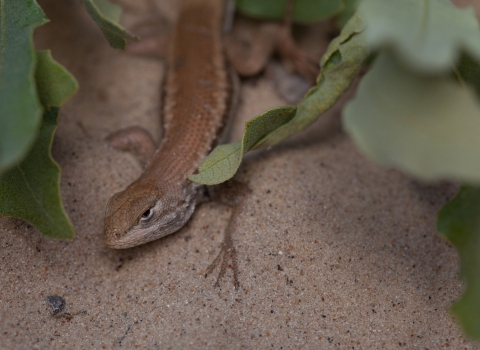RENO, Nev. – Following a review of the best available scientific information, the U.S. Fish and Wildlife Service has determined the Dixie Valley toad is at risk of extinction and is listing the species as endangered under the Endangered Species Act, continuing the protections applied to the toad in the emergency listing rule published April 7, 2022.
"This listing highlights the importance of the Endangered Species Act, and efforts to conserve species like the Dixie Valley toad before population declines become irreversible,” said Service Director Martha Williams. “The Service remains committed to working with our Tribal, federal, state and private partners to conserve rare species and preserve Nevada's unique biodiversity, while also supporting the need for sustainable renewable energy projects on public land,” added Williams.
The Dixie Valley toad is the smallest of the western toads and is endemic to Nevada. Its range is restricted to a 760-acre wetland complex, fed by hot springs in the remote Dixie Valley northeast of Fallon, Nevada. In making this listing determination, the Service has carefully assessed the best scientific and commercial information available regarding past, present, and future threats faced by the Dixie Valley toad, including information received during the proposed rule public comment period.
Primary threats to the Dixie Valley toad include geothermal development, disease, predation by other non-native frog species, groundwater pumping for human and agricultural use, and climate change climate change
Climate change includes both global warming driven by human-induced emissions of greenhouse gases and the resulting large-scale shifts in weather patterns. Though there have been previous periods of climatic change, since the mid-20th century humans have had an unprecedented impact on Earth's climate system and caused change on a global scale.
Learn more about climate change . Protecting small population species like this ensures the continued biodiversity necessary to maintain climate-resilient landscapes in the driest state in the country.
The Service accepted public comments on the proposed rule to list the Dixie Valley toad from April 7 to June 6, 2022. The Service also held a virtual public informational meeting and hearing on May 9, 2022, to explain the proposed rule and accept public comments. The final rule will publish in the Federal Register on December 2, 2022, and can be found on www.regulations.gov by searching under docket number FWS-R8-ES-2022-0024.
The U.S. Fish and Wildlife Service works with others to conserve, protect, and enhance fish, wildlife, plants and their habitats for the continuing benefit of the American people. For more information about our work and the people who make it happen, visit https://www.fws.gov/office/reno-fish-and-wildlife or connect with us via Facebook, Twitter, YouTube and Flickr.



